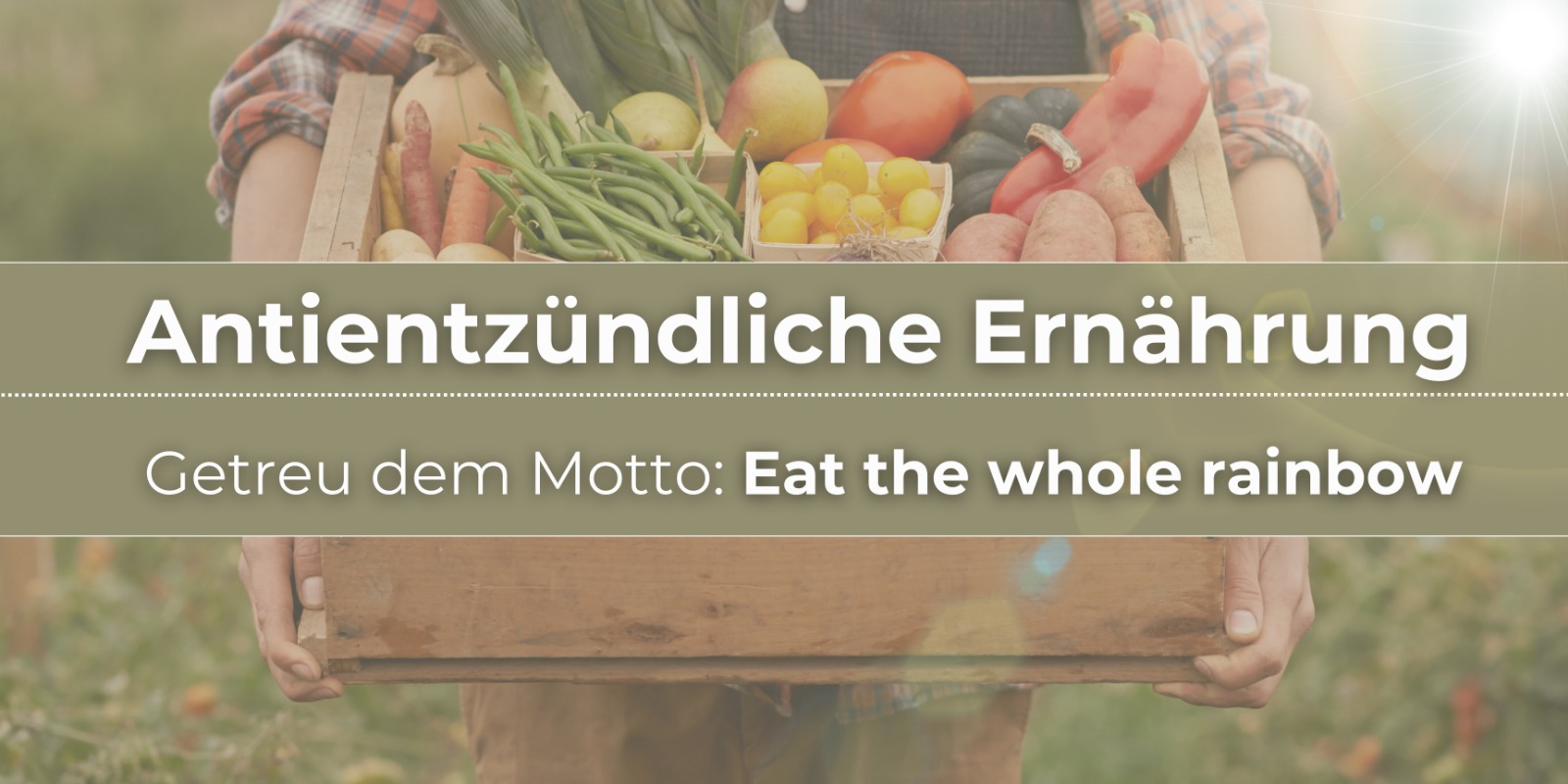
How can I fight inflammation naturally? A targeted anti-inflammatory diet can help. In this article, we explain which foods and nutrients are particularly effective in reducing inflammation and promoting your health.
The most important facts at a glance
- Inflammation is a natural immune responsebut can Chronic inflammation can lead to serious health problems lead,
including diseases such as cardiovascular disease, type 2 diabetes, Alzheimer's, certain cancers and autoimmune diseases. - Eat the whole rainbow! One Anti-inflammatory diet rich in antioxidants and omega-3 fatty acids can help to regulate inflammatory processes and promote health. At its best, a meal has all the colours of the rainbow.
- The Avoidance of inflammatory substances Foods such as sugar, processed foods, alcohol and red meat is crucial for reducing inflammation in the body.
The importance of inflammation in the body
Inflammations are essential reactions of the immune systemthat respond to injuries or infections and contribute to healing. They are a
natural and necessary process that protects the body from pathogens and promotes healing.
But what happens when these inflammatory processes get out of control?
Chronic inflammation can lead to a variety of symptoms, including fatigue, joint pain and poor concentration. This type of inflammation often goes unnoticed and can lead to serious long-term conditions such as rheumatism, diabetes or even cancer. It is therefore important to recognise the signs of chronic inflammation and take measures to combat it.
A targeted anti-inflammatory diet can help reduce overactive inflammatory responses and promote overall health. By including anti-inflammatory foods in our diet, we can not only relieve pain but also correct nutrient deficiencies, which is particularly beneficial for rheumatic diseases.
Knowledge of anti-inflammatory foods is crucial, as breastfeeding Inflammation can lead to serious health problems can. Consciously choosing the right foods can therefore make a big difference to our well-being.
Causes and triggers for inflammation
Chronic inflammation is a silent threat to our health. They often go unnoticed for a long time and can have a significant impact on our health.
body. The causes of such inflammation are varied and include both environmental factors and lifestyle habits.
Lifestyle factors such as stress, lack of exercise, smoking and excessive alcohol consumption are known triggers for inflammatory processes in the body. These factors can unbalance the immune system and lead to faulty immune responses that damage tissue and cause chronic inflammation.
Chronic inflammation is associated with a number of diseases, including
- Bronchitis
- Osteoporosis
- Diabetes
- High blood pressure
- Alzheimer's disease
- Arteriosclerosis
- Crohn's disease
- Depression
- Cancer
- Autoimmune diseases such as arthritis
These diseases show how far-reaching the effects of chronic inflammation can be and how important it is to take action,
to prevent them.
Important nutrients against inflammation
A selection of anti-inflammatory foods that contain important nutrients.
Nutrients play a central role in combating inflammation.
Antioxidant vital substances such as:
- Vitamin A
- Vitamin C
- Vitamin E
- Copper
- Selenium
- Zinc
are essential for neutralising the harmful effects of free radicals and reducing inflammation in the body.
"Eat the whole Rainbow"
A diet rich in these antioxidants can help regulate inflammation and promote health. For example, antioxidants are responsible for the orange in carrots, the deep purple in beetroot, the red in tomatoes, the pink in raspberries, the green in broccoli, the blue in blueberries, the purple in red cabbage and the yellow in peppers. So the idea of ideally incorporating all the colours of the rainbow into a meal is a good benchmark for providing an abundance of antioxidants.
Omega-3 fatty acids are also crucial in the fight against inflammation. Foods such as oily fish, walnuts and chia seeds are rich in these healthy fats and should be regularly included in the diet. Broccoli and blueberries are other examples of foods that
have been proven to have anti-inflammatory properties and should therefore be a frequent part of the diet.
Fermented products such as kimchi and sauerkraut contain probioticswhich have a positive effect on intestinal health and the regulation of inflammatory processes. These foods increase the diversity of microbes in the gut, which is very important for healthy immune function and fighting inflammation.
Vegetables and fruit with an anti-inflammatory effect
Vegetables and fruit play a crucial role in combating inflammation. They provide essential nutrients and phytochemicals that have been shown to have anti-inflammatory properties. Regular consumption of these foods can help to reduce the risk of chronic inflammation and improve overall health.
Broccoli is an excellent example of a vegetable with strong anti-inflammatory properties. It is rich in secondary plant substances that help to reduce inflammation. Other types of cabbage such as Brussels sprouts and red cabbage have similar positive effects on health.
Colourful berries, such as raspberries, blackberries and blueberriesare also rich in antioxidants and anti-inflammatory compounds. The
Regular integration of these fruits into the diet can increase the absorption of antioxidants and thus help to combat inflammation.
Fermented foods and their benefits
Fermented foods such as sauerkraut and kimchi have numerous health benefits, including strengthening the immune system and protecting against inflammation. The probiotics contained in these foods promote healthy intestinal flora, which plays an important role in regulating inflammatory processes.
However, it is important to consume fermented dairy products in moderation, as excessive intake can lead to mucus build-up and hyperacidity. A conscious selection and moderate consumption of fermented foods can therefore make a valuable contribution to reducing inflammation and to general health.
Spices and herbs as natural anti-inflammatories
Spices and herbs are not only culinary enrichments, but also powerful natural anti-inflammatories. Turmeric, known for its
strong anti-inflammatory properties, can be replaced by curry powder if the flavour is not to your liking. The combination of
Turmeric with black pepper increases absorption in the intestine and enhances the anti-inflammatory effect.
Cayenne pepper is another spice that has an anti-inflammatory effect due to the ingredient capsaicin and has a positive effect on the composition of the intestinal bacteria. Cinnamon also blocks the activity of pro-inflammatory molecules and should preferably be used in the form of Ceylon cinnamon, as this contains less coumarin.
Other beneficial spices include nutmeg, which inhibits the synthesis of nitric oxide, and antioxidant nutrients such as vitamin E, which is found in fatty foods such as nuts and avocados and acts as an antioxidant.
Pulses and nuts
Pulses and nuts are essential components of an anti-inflammatory diet. A A balanced ratio of omega-3 to omega-6 fatty acids is crucialto reduce inflammation in the body. Walnuts and seeds such as linseed and chia are important sources of omega-3 fatty acids and should be consumed regularly.
Regular consumption of pulses can reduce the risk of chronic inflammation and contribute to general health. One
Handfuls of nuts or seeds daily can provide additional antioxidants and healthy fats that have an anti-inflammatory effect.
Oils such as olive oil and avocado contain monounsaturated fatty acidswhich also help to combat inflammation. These healthy
Fats are an important part of a balanced and anti-inflammatory diet.
Avoid pro-inflammatory foods Foods that have a pro-inflammatory effect and should be avoided.
To combat inflammation effectively, it is important to avoid foods that promote inflammation.
Here are some foods that should be removed from your diet:
- Industrially processed food
- Sugar
- Ready-made sauces
- Ready-made pizza
- Sausage
- Cheese
- Ready-made desserts
- Fruit yoghurts
- Pastries containing gluten
In addition, meat, sugar and simple carbohydrates should be greatly reduced, as they can promote inflammation in the body. Red meat in particular contains unhealthy saturated fatty acids and trans fats, which favour inflammation.
Unhealthy eating habits can also lead to the production of pro-inflammatory hormones caused by abdominal fat. A conscious and balanced diet is therefore essential to reduce inflammation in the body.
Practical tips for everyday life
An example of an anti-inflammatory eating day could include a berry smoothie for breakfast, an rocket and salmon salad for lunch and quinoa with vegetables for dinner. These meals are not only delicious, but also rich in anti-inflammatory nutrients.
Good planning is key to integrating anti-inflammatory foods into your everyday life. It pays to prepare meals in advance, shop consciously and opt for fresh and unprocessed foods. Small changes can make a big difference to your health and well-being.
Summary
Fighting inflammation through a targeted diet is a powerful tool for improving health. By choosing foods rich in antioxidants, omega-3 fatty acids and other anti-inflammatory nutrients, we can reduce the risk of chronic inflammation and improve our wellbeing.
A conscious diet can not only alleviate pain, but also reduce the risk of serious illness. Integrating an anti-inflammatory diet into everyday life is an important step towards a healthier and happier life.
Frequently asked questions
- What are the main causes of chronic inflammation?
The main causes of chronic inflammation are stress, lack of exercise, smoking and excessive alcohol consumption. These factors should be avoided in order to reduce the risk of chronic diseases. - Which nutrients are particularly important for combating inflammation?
Antioxidant nutrients such as vitamins A, C, E, copper, selenium, zinc and omega-3 fatty acids are essential for combating inflammation. These nutrients contribute significantly to the reduction of inflammatory processes in the body. - Which foods should be avoided to reduce inflammation?
To reduce inflammation, you should avoid industrially processed foods, sugar, ready-made sauces and pastries containing gluten. These foods can have a pro-inflammatory effect. - How can fermented foods help against inflammation?
Fermented foods support health through their probiotics, which promote a balanced intestinal flora and can therefore regulate inflammation. Regular consumption can therefore help to alleviate inflammation. - Which spices have anti-inflammatory properties?
Among others, turmeric, black pepper, cayenne pepper and cinnamon are spices with strong anti-inflammatory properties. Their use can help to reduce inflammation in the body.

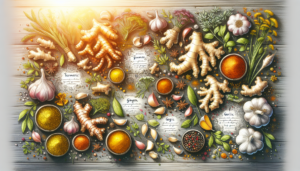
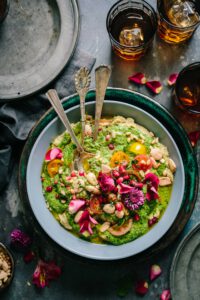
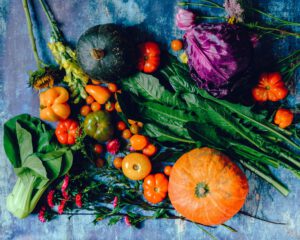

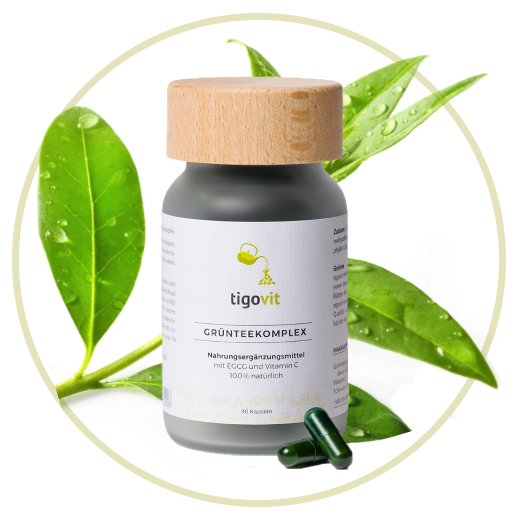

Leave a Reply